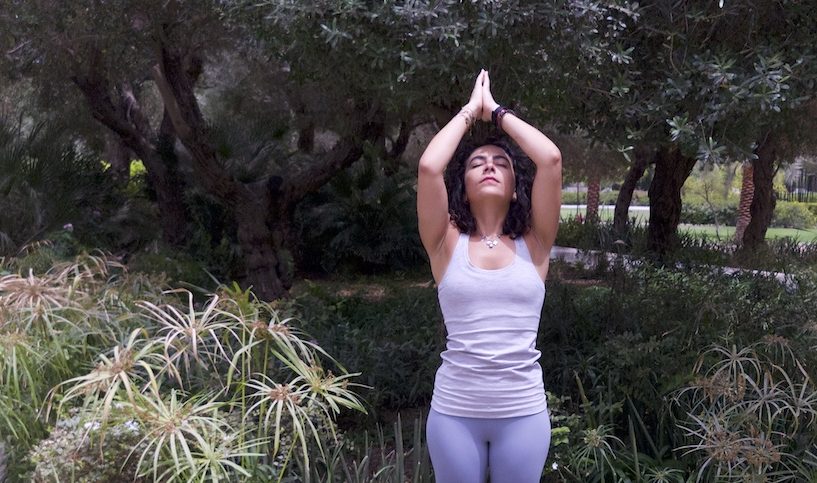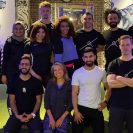We all experience it. Burnout, exhaustion, feeling overwhelmed and not understanding what’s been going on. So you try to find the answers to make yourself feel better but end up looking in the wrong places, or you just end up as confused as ever. It’s a part of life, isn’t it?
Huda Faraj knows the feeling all too well, and she approaches it with a gentleness and kindness that existed far before her yoga practice (which this writer can say with absolute confidence) but has been enhanced throughout her entire journey.
“I didn’t set out to become a yoga teacher when I decided to do my yoga teacher training in Bali” she confides in me. “I just wanted to find myself.”
And find herself she did, or rather, she advanced in finding her true purpose, or dharma as the yogis call it, at least. After 10 years of working corporate jobs in luxury and F&B marketing, Huda’s burnout led her to an intensive 200 hour course in Bali that would change her perspective on life as she thought she had always known it. “When I came back, I felt different, and saw things in a way I never had before. And that was just from a month of being away. It was a huge turning point in my life which made me want to dive deeper into it and research more to understand what it is that’s so amazing about this.”
Huda’s diving led her to understanding that the things she put so much weight on before did not actually matter – where you are in your career, what you do, whether or not you’re married – the race of comparing oneself to other people. “I realized that none of it mattered, and that is how I changed so drastically. I thought no way is the YTT the end of my journey, and so I did my research and came across the Yoga Therapy Institute and I was like ‘yoga therapy, what is that?’”

So, Huda began to teach small classes to friends and family free of charge at home in order to gain the experience she needed to get into the Yoga Therapy Institute. Posting information from her studies under the moniker Yogiation as a portmanteau of “Yoga and Nation” – a term she made up herself to mirror her practice’s ethos that yoga indeed belongs to everyone. She experimented by teaching Yin classes to friends and family at home in order to expand on her teachings, she topped it off with a 300-hour Advanced Integrated Training course online during the height of COVID (while the rest of us were eating chips) and kept teaching herself through observation and experience.
“My practice is adaptive”, she explains. This means that Huda gets to know each of her clients and what their unique needs are, adapting sessions and practices to serve them. “The way I work is bio, psycho, socio and spiritual: the bio part focuses on your body, psycho focuses on your mind, socio is your environment and social surroundings and spiritual is your belief system. All of these factors play a role in your well-being and that’s also what yoga therapy tackles. It’s about the whole body, not just individual parts of it.”
Huda’s practice also strays away from singling out any body parts, even when patients of clients come to her with a clear ailment or maladie. “The difference between yoga therapy and physiotherapy, for example, is that physios will draw attention to that one body part that’s bothering you, and work on strengthening it. Yoga therapy differs by making you in tune with your body and your mind, shifting your attention away from what’s hurting you, and helping you focus on how you feel on the inside. Everything is connected, and we dig deep into your lifestyle in order to help you discover solutions that may lead towards upgraded living.”
And how does Huda guide people towards an upgraded lifestyle? Through empowerment. Her strategy is to break the barriers when it comes to mindful movement practices and really dig deep into what’s going on with them. So much so that when I asked her to give me a sample session, she looked at me seriously and answered “I don’t think you understand how long my sessions usually are” and that’s only because she’s so thorough.
“During the first session, we talk about your lifestyle, your relationships, your habits, your goals and wishes and aspirations. Then, we work on instilling movement which is compatible with any ailments you have. Everyone has ailments, but there isn’t a one size fits all solution for everything that causes trouble in the body.” Besides an engaged conversation surrounding the inner-depths of your body’s well-being, Huda also sends you back with homework to create strategies that may help find solutions for your ailments. “Yoga therapy is a form of self-empowerment because we encourage you to discover what works for you through asking questions and working together.”
Admittedly, after finally getting to experience a “yogiation” class for myself (though huda does not teach under the name Yogiation and makes it a point when she does choose to teach group classes to keep it capped to six people in order to keep the intimacy and focus on other students’ body work) I could see what she meant. Even the most cynical of people towards the yoga practice would find this enjoyable, complete with huda’s adaptive instructions such as keeping all movements exclusively on or close to the floor, a meditative savasana “the most important part” she tells me, and the soothing sound bath that accompanies her practice. I personally saw blue and purple hues in time to the sound bath, and as she told me that I might want to check in on my communication, I knew I was hooked. Yogiation and yoga therapy in general by Huda is something we can all greatly benefit from.

“Just give me a bit more time,” she tells me with a smile. Huda is at the last leg of her accreditation journey, having just finished up her last module at the Yoga Therapy Institute and is starting her next mission: collecting 22 Case Studies before writing a thesis in order to obtain her yoga therapist license. “And then, I’ll be able to work at any specialized clinic in the world.” If that means you can help me fix my anxiety and my bad back, then by all means, Huda.
TRUTH OR DARE
How would your mother describe you in one word?
Passionate.
How would you describe your mother in one word?
Pure.
What is the most ridiculous question you’ve ever been asked?
”Where are you from?” I’m from Mother Earth. “Okay but what’s your nationality” I’m a citizen of the world. In my eyes, this dialogue is ridiculous.
What is the most spontaneous thing you’ve ever done?
Quitting my corporate job and deciding to go to the other side of the world on my own to “find myself”. It was totally unplanned and I’m thankful for taking that leap of faith because that’s when my life took a 180 degree turn.
What is your theme song?
I Like to Move It – Real to Reel.
What word in the English or Arabic language do you wish you had invented?
Yogiation: a combination of yoga and nation. I already use this made-up word as my Instagram account handle.
Where would you like to live? What is your dream retirement location?
Bali, or anywhere that is full of nature; something I completely feel at home with.
What is the first famous quote that comes to your mind?
“Life is like riding a bicycle. To keep your balance, you must keep moving.” -Albert Einstein.
Which animal best describes the kind of partner you’d be interested in?
A fox: They are curious and clever, and they analyze and influence others while being understanding.
What do you miss about your childhood?
Being creative with outdoor games without needing to use excessive props, just our imaginations.
If you could change your name, what would you change it to?
Honestly, I never thought about another name for myself because I love mine.
How would you describe your handshake in one word?
Firm.
What is the toughest part of your character?
Being extremely direct. It can sometimes come across as being rude.
Who is your favorite historical figure?
Carl Rogers: A psychologist who developed the client centered approach. His approach is empowering by helping people find their own answers to their own questions rather than the therapist coming up with solutions for the patient. This encourages people to reach their full unique potential.
What in the world do you least desire?
Greed.
What do you think is lacking in the world, which if there was more of would make the world a better place?
Awareness and self inquiry.
Why do you think most girls/guys like you?
Because they feel comfortable around me.
Finish this sentence: “Happiness is a thing called…”
Contentment.
Empower yourself and discover Huda’s unique therapeutic practices by following her on Instagram @yogiation.








